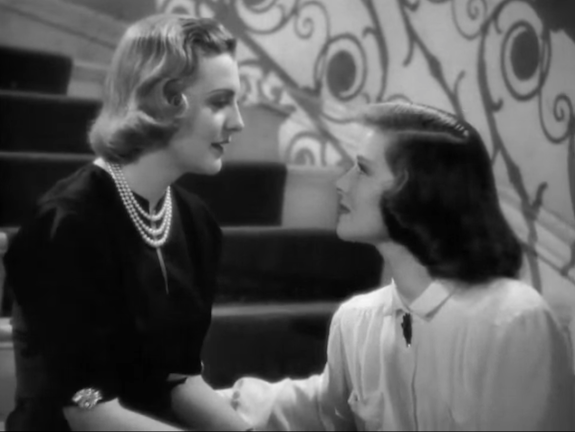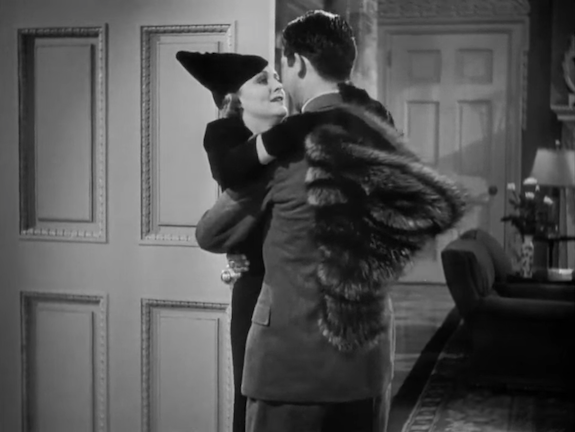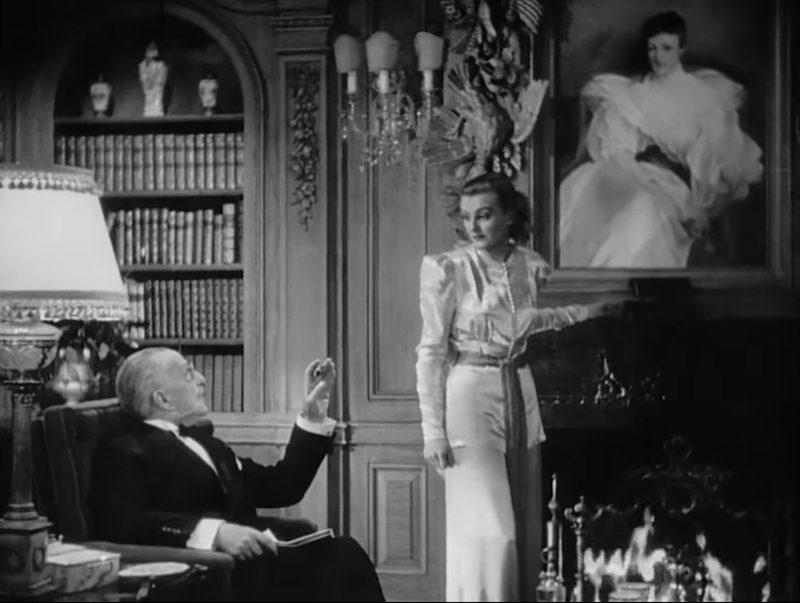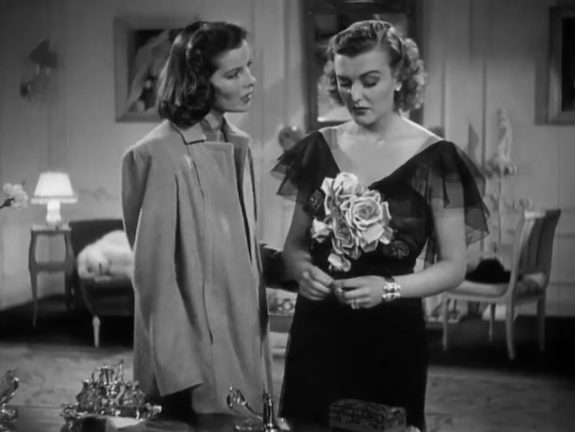1938: Doris Nolan in "Holiday"
 Thursday, August 27, 2020 at 1:00PM
Thursday, August 27, 2020 at 1:00PM
Before each Smackdown, Nick Taylor highlights alternates to the Oscar nominations for Best Supporting Actress...

I’ve written about a lot of movies for this series that have meant a great deal to me, both because I love them and because they are very, very good. With only three events left in this current Smackdown season, I think I can safely guess that I will not be writing about a film that has touched me quite as dearly as Holiday has. Along with being an indisputable peak in classical Hollywood filmmaking, in the romantic comedy genre, in the careers of its directors and its leading couple, the film is also a deceptively sharp ensemble feature. To say any performer matches the heights Katharine Hepburn and Cary Grant reach would be hard to argue, but to call Doris Nolan's savvy, multifaceted supporting turn as the character who kicks the whole plot into motion a sterling achievement all its own is a claim I'd be very happy to make...
Our story begins with Johnny Case (Cary Grant), a self-made man in New York who returns home from the first vacation he’s taken in his life with news that he’s engaged to someone named Julia Seton (Doris Nolan). Much to the surprise of his friends Nick and Susan (Edward Everett Horton and Jean Dixon), Johnny knows almost nothing about his bride-to-be, and is trusting their compatibility at Lake Placid will withstand any obstacles the world might throw their way. Still, this doesn’t prepare Johnny for his discovery that Julia Seton is actually part of the Seton dynasty, currently headed by business-savvy patriarch Edward (Henry Kolker). Julia also has a younger brother named Ned Jr. (Lew Ayres), who’s become deeply cynical under the pressure of his father’s expectations, and an older sister named Linda (Katharine Hepburn), who’s as put off by the family fortune as Ned but is instead kinetic, intelligent, and painfully optimistic.

No, I can’t imagine anyone would doubt for a second that Grant’s prankish, idealistic Johnny would end up with anyone but Hepburn’s vivacious, quick-witted Linda, each of whom gives one the greatest performance of their careers. Yes, the broad strokes of Johnny’s rebellion against the bottomless capitalism of Mr. Seton is the kind of work/life dilemma that many a Hallmark movie has flimsily reconfigured into having a job you love vs empty careerism. What elevates all of this is that Holiday is extravagantly interested in revealing its characters through the specific contexts John Barry’s script has devised for them. Everyone remains exactly who they were from the moment they first walked on screen, but our understanding of them as full, complicated human beings only grows with each scene. Director George Cukor also lends real gravity to Holiday’s conversations about duty and money. Johnny’s dream of retiring in adulthood so he can enjoy life while he’s still young is both an entrancing, romantic dream, as well as a severe refusal of the kind of wage-slavery Mr. Seton aspires to and encourages in his children, each of whom have responded to his philosophies in their own way.
Nolan’s performance resides at a tricky crossroads between Holiday’s humanistic impulses and its questions of personal freedoms versus institutional loyalties. Holiday isn’t interested in giving a “reason” why Julia will eventually fall out of Johnny’s favor, and Nolan follows suit. From her first scene, walking in on Johnny marveling at the sheer size of her family’s mansion, Julia emerges as a luminous, credible romantic partner in her own right. She gets about as great an entrance as any human being is lucky to get, sweeping her arms around Cary Grant and embracing him in a long, passionate kiss. Both actors seem completely devoted to each other, but even at their most impassioned they still delineate between when they’re connecting to the bliss of their time at Lake Placid and when they’re seeing entirely new sides of each other. Julia is almost bashful at his awe of her enormous wealth, and a bit surprised by some of his methods for declaring that awe, like hollering in a living room to hear the echo (granted, it’s quite a living room). She also conveys a steely but undemonstrative certainty when she declares him to be a future multimillionaire as part of her father’s business, and seems quietly incensed at his own declaration that he has no intentions of doing so. They don’t come across as soulmates, but as committed, enamored individuals who are going to have to decide how their principles will mesh together once they get married.

That being said, everyone has a different idea about whether Julia and Johnny will actually go through with their engagement. Linda is certain Julia will choose him, now that she’s finally faced with such a dashing, wonderful embodiment of so many of the ideals Linda has championed all their lives. Ned has no faith in her, though his blanket cynicism makes him a slightly less appealing source of wisdom. Nolan doesn’t work to foreshadow Julia’s decision, maintaining a rich sense of personality while evoking real history with her co-stars. She connects with the script’s cleverness and Cukor’s warmly melancholic tone, giving Julia the same crackling wit as Linda but replacing Hepburn’s gutsier energy with a sense of someone who’s always in control of their emotions. She knows what it means to be a Seton, and strives to fulfill that obligation with a sense of purpose and propriety that aligns her with her father more than either of her siblings. Julia also matches John’s pragmatism and sense of obligation, even as it becomes clearer he isn’t built for the high society rituals Julia thrives in. You can see in both cases why they’d keep trying to find common ground, even as the gulf between their own ambitions grows further apart. It’s even more remarkable that Nolan is able to convey all of this through a clarity in voice and posture, delivering her characterization almost exclusively in profile to the camera.
What Nolan ultimately achieves is akin to Anne Baxter in All About Eve, playing an emotionally articulate woman while carefully sustaining the central tension of where her priorities ultimately lie. She does this in a far more peripheral role, minus the more conspicuous aura of mystery and duplicity that quickly cultivates around Eve. Julia is fundamentally the same woman at the end as she was when we first met her, but when she finally confirms whether she’ll go through with her marriage to Johnny, we’ve learned so much about both of them that it’s a wonder they ever seemed compatible. And yet, it’s a tribute to Holiday that the fissures in their relationship prompt real curiosity about what made them convinced to get engaged during that vacation at Lake Placid. What does this fantastically impulsive gesture say about Julia, who seems so swayed by Johnny’s romanticism and high ideas even as she’s largely resistant to how he displays these traits back in the world? How will this ordeal influence what she’s looking for in future partners? What is she going to say to Linda the next time they see each other? Her final rebuke, rendered with an acute awareness of how badly the past few days have gone, is so bitter that we cannot blindly discount her fate even as we relish in John and Linda sailing off into the sunset. It’s an unexpected last note from this character, but like so much of Holiday, it’s an insight that Cukor and his artists have been building towards without our noticing.




Reader Comments (12)
Interesting choice! If I were going to pick a contender from a 1938 Katharine Hepburn movie, it would be Virginia Walker or her old Oscar rival May Robson, both from Bringing Up Baby. But, sadly, Bringing Up Baby was not on Oscar's radar that year the way My Man Godfrey and The Awful Truth were. I'd also suggest Ann Miller from You Can't Take It with You, as I am still surprised that Spring Byington made it in that year over Miller.
What a terrific surprise to come across this lovely tribute to Doris Nolan and her superb work in "Holiday". To my mind, she was far and way best in her category that year. Yet, sadly, no nomination. Even more disappointingly, post "Holiday", the lady acted in very few films, none of them consequential. What a shame we don't have more souvenirs of what was clearly a very special talent. The lady married actor Alexander Knox in 1943; it was a show business union that lasted.
Terrific post!
I love this film so much! It's probably my favorite of both of the stars filmographies and infinitely better than the original with Ann Harding and Mary Astor (who in Nolan's role was the strongest part of that picture.)
However here is where we differ, I think Doris Nolan while extremely competent in her role and performance is the least impressive part of the film. Not a weak link but not as affecting as the others. Whenever I watch it I can't help but think that Joan Bennett as Julia would have punched the character across more forcefully since she was a more vivid personality and would have made Johnny's choice a bit more difficult. Plus she and Cary had worked together in a couple of minor comedies while both were working there way up and had their own strong chemistry which might have added another layer to the relationship. Oh well Nolan is good I just don't love the performance.
The best supporting performance in the film to me is without question Lew Ayres's bruised and almost crushed Ned.
@Nathaniel - I like the supporting women of Bringing Up Baby a lot but none really stood out for me on their own. Strong cast though, especially Hepburn and Grant.
@Ken - I’m honestly shocked how little prominent work she had after this. It’s not earth-shattering work, but she’s gorgeously communicative in a semi-showcased role. Would’ve been nice to see her get more big parts, or if Holiday could’ve racked up a boatload of Oscar nominations besides its single, incredibly deserving Art Direction nomination.
@joel6 - Admittedly, I’m not familiar enough with the actresses of this era to have a real recasting choice. I liked Mary Astor in the original but I don’t think I’ll ever be able to look at it clearly given how much I love this version. Completely agree that Lew Ayres is the standout of the supporting cast, but I do love how much of an impression Nolan made. It’s smart character work, and coming in fourth of a quartet like this still entails a very strong performance.
Also, this is not a year I’m overly familiar with. Would love to hear who everyone thinks should’ve made an impact on the Supporting Actress race this year.
Nick, another performance that should have been on the Academy radar is Beulah Bondi in Vivacious Lady. Once again she plays Jimmy Stewart's mother, but this version is a slyer, looser, more fun character than her usual mother roles. I believe she played his mother five times.
But instead the Academy recognized her with a supporting nomination in 1938 for playing his mother in Of Human Hearts. It's a decent performance, but hardly memorable or nearly as fun.
On the whole, there's not many other memorable supporting actress performances for 1938. It was a more interesting year for supporting actors beyond the nominated ones.
Nick-as far as alternates to the supporting actress category I'd say some there are some obvious misses like Olivia de Havilland in Adventures of Robin Hood and May Robson for either Bringing Up Baby or Four Daughters. I'd also say Dame May Whitty was worthy in The Lady Vanishes.
But some other more obscure but still excellent choices are Mary Astor in Paradise for Three and Margaret Sullavan in The Shining Hour.
I know Beulah Bondi made it in for Of Human Hearts but I would have rather seen her in for Vivacious Lady.
Doris Nolan would definitely have been my winner that year. As for the other nominees, I'd have retained Beulah Bondi for "Of Human Hearts". Not an actress I've warmed to much over the years. To my mind, she generally gives off an air of self satisfaction, whether the role calls for it or not. And that rusty bedsprings voice of hers has never been my cup of tea, But I think she brings her A game to "Of Human Hearts". And - within the context of the film's smoothly functioning sentimentality, it works nicely. As for the other slots - Paulette Goddard, a vivacious standout in "The Young in Heart", Varvara Massalaitinova, bringing an awesome elder presence to "The Childhood of Maxim Gorky": and Judy Garland who always upped the ante in otherwise tepid Andy Hardy movies. "Love Finds Andy Hardy" in 1938 was her first foray into the series and - no surprise - she's luminous.
Yeah, I found the movies celebrated in 1938 to be rather dull and hard to connect to the lead performances that year, let alone finding anything special in supporting performances. In addition to those already suggested, I'd add Una O'Connor in The Adventures of Robin Hood, but that's really about it.
@Everyone - Thank you for all your recommendations!!! Nice mix of titles I have and haven't heard of before. Vivacious Lady is definitely next on the watch list. And I'm very curious about all of the movie Mary Astor made this year too.
@Everyone - Thank you for all your recommendations!!! Nice mix of stuff I've heard of and stuff I haven't - looks like The Vivacious Lady is next on my watch list. And I'm very excited to see how many of Mary Astor's movies I can track down from this year.
Lew Ayres has the best performance in the entire film. I came for Grant and Hepburn but I couldn’t stop thinking about Ayres.
Lew Ayres did get a citation for Best Acting from National Board of Review Award 1938, while Cary & Kate r totally ignored by all.........